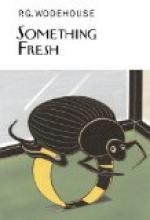At the moment when Ashe broke the news he would have parted with half his fortune to recover the scarab. Its recovery had become a point of honor. He saw it as the prize of a contest between his will and that of whatever malignant powers there might be ranged against him in the effort to show him that there were limits to what he could achieve. He felt as he had felt in the old days when people sneaked up on him in Wall Street and tried to loosen his grip on a railroad or a pet stock. He was suffering from that form of paranoia which makes men multimillionaires. Nobody would be foolish enough to become a multimillionaire if it were not for the desire to prove himself irresistible.
Mr. Peters obtained a small relief for his feelings by doubling the existing reward, and Ashe went off in search of Joan, hoping that this new stimulus, acting on their joint brains, might develop inspiration.
“Have any fresh ideas been vouchsafed to you?” he asked. “You may look on me as baffled.”
Joan shook her head.
“Don’t give up,” she urged. “Think again. Try to realize what this means, Mr. Marson. Between us we have lost ten thousand dollars in a single night. I can’t afford it. It is like losing a legacy. I absolutely refuse to give in without an effort and go back to writing duke-and-earl stories for Home Gossip.”
“The prospect of tackling Gridley Quayle again—”
“Why, I was forgetting that you were a writer of detective stories. You ought to be able to solve this mystery in a moment. Ask yourself, ‘What would Gridley Quayle have done?’”
“I can answer that. Gridley Quayle would have waited helplessly for some coincidence to happen to help him out.”
“Had he no methods?”
“He was full of methods; but they never led him anywhere without the coincidence. However, we might try to figure it out. What time did you get to the museum?”
“One o’clock.”
“And you found the scarab gone. What does that suggest to you?”
“Nothing. What does it suggest to you?”
“Absolutely nothing. Let us try again. Whoever took the scarab must have had special information that Peters was offering the reward.”
“Then why hasn’t he been to Mr. Peters and claimed it?”
“True! That would seem to be a flaw in the reasoning. Once again: Whoever took it must have been in urgent and immediate need of money.”
“And how are we to find out who was in urgent and immediate need of money?”
“Exactly! How indeed?”
There was a pause.
“I should think your Mr. Quayle must have been a great comfort to his clients, wasn’t he?” said Joan.
“Inductive reasoning, I admit, seems to have fallen down to a certain extent,” said Ashe. “We must wait for the coincidence. I have a feeling that it will come.” He paused. “I am very fortunate in the way of coincidences.”




